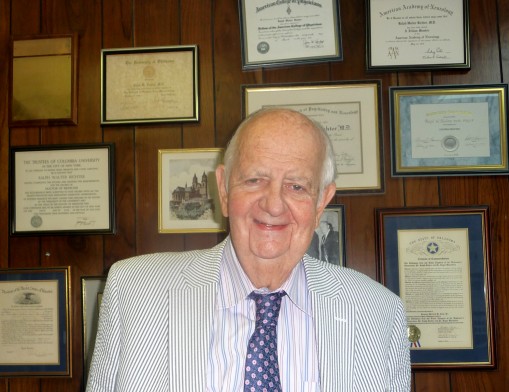
Tulsa Clinical Research conducts clinical trials in all phases. One of their most vital trials currently is for Alzheimer’s disease, now underway to test a new drug that shows promise for slowing the relentless progression of memory loss and mental decline in Alzheimer’s patients. The clinical research study is testing whether this investigational drug can help maintain memory and day-to-day living in people with mild Alzheimer’s disease. There hasn’t been a new drug approved to treat Alzheimer’s in a decade, but researchers are working hard to change that.
Ralph W. Richter, MD, FACP, established Tulsa Clinical Research, LLC in 1986. As its founder and current president, Dr. Richter’s experience is unparalleled. He maintains a private practice in neurology and neuropsychiatry. Dr. Richter is also Clinical Professor of Neurology and Psychiatry at the University of Oklahoma College of Medicine in Tulsa. In addition to numerous other publications, he is the author of “Alzheimer’s Disease: A Physician’s Guide to Practical Management.”
Dementia is an overall term for diseases and conditions characterized by a decline in memory or other thinking skills that affects a person’s ability to perform everyday activities. Alzheimer’s disease is the most common form of dementia. Dr. Richter shares a few signs that someone may have dementia: being unable to remember things; asking the same question or repeating the same story over and over; becoming lost in familiar places; being unable to follow directions; getting confused about time, people, and places; trouble understanding visual images and spatial relationships; new problems with words in speaking or writing; neglecting personal safety, hygiene, and nutrition; decreased or poor judgment; withdrawal from work or social activities; and changes in mood and personality, including apathy and depression.
Everyone experiences a phenomenon called age-related memory loss. As we get older, our memory simply isn’t what it used to be. Many people, however, use this common, normal forgetfulness as an excuse to ignore more serious memory problems. If you have a relative or loved one with whom you’re concerned may have more serious memory problems, observe them for a few weeks; this will help you get a feeling if their memory problems are a normal part of aging, or if it could possibly be something more serious.
The trials at Tulsa Clinical Research are sponsored by the National Alzheimer’s Association and the National Institute of Aging. Their goal is to identify those at risk and treat with medication before symptoms become severe. The prevention studies at Tulsa Clinical Research utilize imaging procedures to look at an individual’s brain structure and metabolism to determine if they are at risk to develop Alzheimer’s. “You cannot arrest the disease, but you can slow it down,” says Dr. Richter. “The amount of time between when subtle symptoms of dementia begin and when diagnosis occurs is eight years – that’s a lot of lost time. It is important to begin preventative treatment as early as possible.”
According to the Alzheimer’s Association, 1 in 9 Americans aged 65 or older has Alzheimer’s disease. An estimated five million people are living with this disease in America, and those numbers will increase as the population ages. “It’s important to remember that you’re not alone. Many other people are facing similar challenges,” Dr. Richter adds.
With more than 200 national and international clinical research studies, experience is at the core of Tulsa Clinical Research. The staff of Tulsa Clinical Research is dedicated to excellence in research trials. “With minimal screen-failures, rapid enrollment, optimal compliance, study adherence, and caregiver support, our track record is spotless,” says Dr. Richter. “We strictly follow GCP (Good Clinical Practice) and SOPs (Standard Operating Procedures) in accordance with FDA regulatory guidelines. Not only do we provide high quality data, our friendly, motivated staff members seek to serve the patient and their family.” Tulsa Clinical Research conducts a large number of other clinical trials including depression, COPD, fibromyalgia, adolescent ADHD, and many more. To learn more about participating in a clinical trial, call (918) 743-2349.

